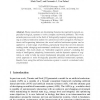Free Online Productivity Tools
i2Speak
i2Symbol
i2OCR
iTex2Img
iWeb2Print
iWeb2Shot
i2Type
iPdf2Split
iPdf2Merge
i2Bopomofo
i2Arabic
i2Style
i2Image
i2PDF
iLatex2Rtf
Sci2ools
122
Voted
ECAL
2005
Springer
2005
Springer
Artificial Homeostatic System: A Novel Approach
Abstract. Many researchers are developing frameworks inspired by natural, especially biological, systems to solve complex real-world problems. This work extends previous work in the field of biologically inspired computing, proposing an artificial endocrine system for autonomous robot navigation. Having intrinsic self-organizing behaviour, the novel artificial endocrine system can be applied to a wide range of problems, particularly those that involve decision making under changing environmental conditions, such as autonomous robot navigation. This work draws on “embodied cognitive science”, including the study of intelligence, adaptivity, homeostasis, and the dynamic aspects of cognition, in order to help lay down fundamental principles and techniques for a novel approach to more biologically plausible artificial homeostatic systems. Results from using the artificial endocrine system to control a simulated robot are presented.
Related Content
| Added | 27 Jun 2010 |
| Updated | 27 Jun 2010 |
| Type | Conference |
| Year | 2005 |
| Where | ECAL |
| Authors | Patrícia Amâncio Vargas, Renan C. Moioli, Leandro Nunes de Castro, Jon Timmis, Mark Neal, Fernando J. Von Zuben |
Comments (0)

